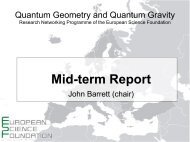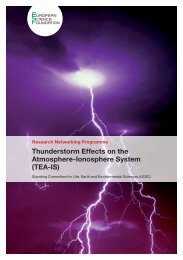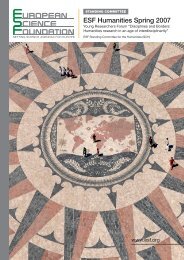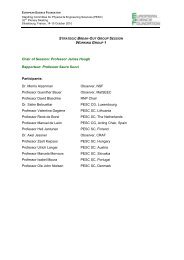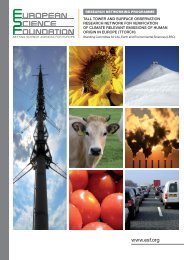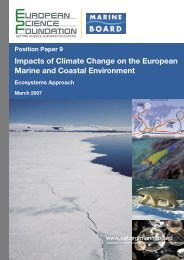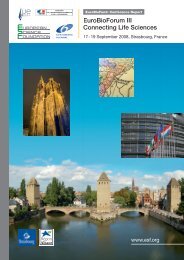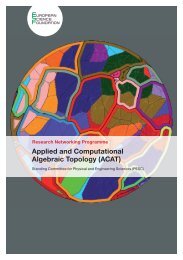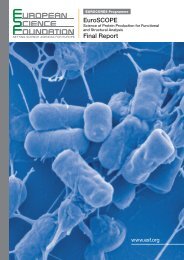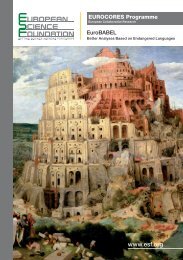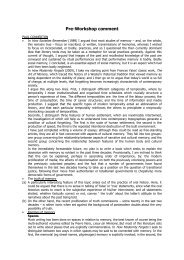European Peer Review Guide - European Science Foundation
European Peer Review Guide - European Science Foundation
European Peer Review Guide - European Science Foundation
Create successful ePaper yourself
Turn your PDF publications into a flip-book with our unique Google optimized e-Paper software.
7.<br />
Programmes for the Creation<br />
or Enhancement of Scientific<br />
Networks<br />
l l l<br />
62<br />
<strong>European</strong> <strong>Peer</strong> <strong>Review</strong> <strong>Guide</strong><br />
7.1 Purpose and scope<br />
Programmes for the Creation or Enhancement of<br />
Scientific Networks are meant to promote networking,<br />
by facilitating discussion and exchange of<br />
ideas on a specified thematic area, issue or problem.<br />
Unlike the Collaborative Research Programmes,<br />
these programmes do not contain funding of the<br />
research itself. The main aim of Scientific Network<br />
Programmes is to facilitate interactions among<br />
researchers with established research programmes<br />
and between researchers and stakeholders, to create<br />
interdisciplinary fora, to encourage sharing knowledge<br />
and expertise, to develop new techniques and<br />
to train new scientists. To this end, the organisation<br />
of science meetings (workshops, seminars, conferences<br />
or schools), networking activities, exchange<br />
visits or other events are supported.<br />
Furthermore, some programmes support activities<br />
related to scientific diffusion, such as the<br />
publication of information brochures and leaflets,<br />
CDs, books and meeting proceedings as well as the<br />
creation and management of dedicated scientific<br />
websites or scientific databases. These networks may<br />
also serve to stimulate new debate across boundaries,<br />
for example, disciplinary, conceptual, theoretical,<br />
methodological, at national and (especially) at international<br />
level. This may lead in particular to later<br />
pluridisciplinary proposals.<br />
There are variations that may influence specific<br />
aspects of the peer review process as elaborated<br />
below:<br />
(i) Thematic or non-thematic calls<br />
In the former, the theme or topics to be addressed<br />
by the project are defined in advance. The proposed<br />
network must therefore fall within the thematic or<br />
topical scope of the call, and the relevance of the<br />
proposal to the call can be an important measure in<br />
the peer review evaluation. In non-thematic calls, a<br />
broad scientific field or domain is normally determined<br />
within which collaboration is to be promoted.<br />
The scope of the proposals can then vary substantially<br />
within that field.<br />
(ii) National versus multinational<br />
Whether a programme is national or international<br />
can significantly affect the nature of the required<br />
peer review process. The implications can span the<br />
whole life-cycle of the process from beginning to<br />
end. National programmes can be used to:<br />
• Create new networks in order to stimulate research<br />
within targeted areas with the goal of enhancing<br />
synergy;<br />
• Further enhance synergies among disparate existing<br />
networks;<br />
• Extend the scope of national networks into international<br />
arenas;<br />
• Promote and/or create pluridisciplinary networks.<br />
Within a larger context, the above-mentioned targets<br />
can be defined for a group of countries. These<br />
can take the form of bilateral agreements or larger<br />
scale multilateral programmes.<br />
According to the survey, from the 30 respondents,



